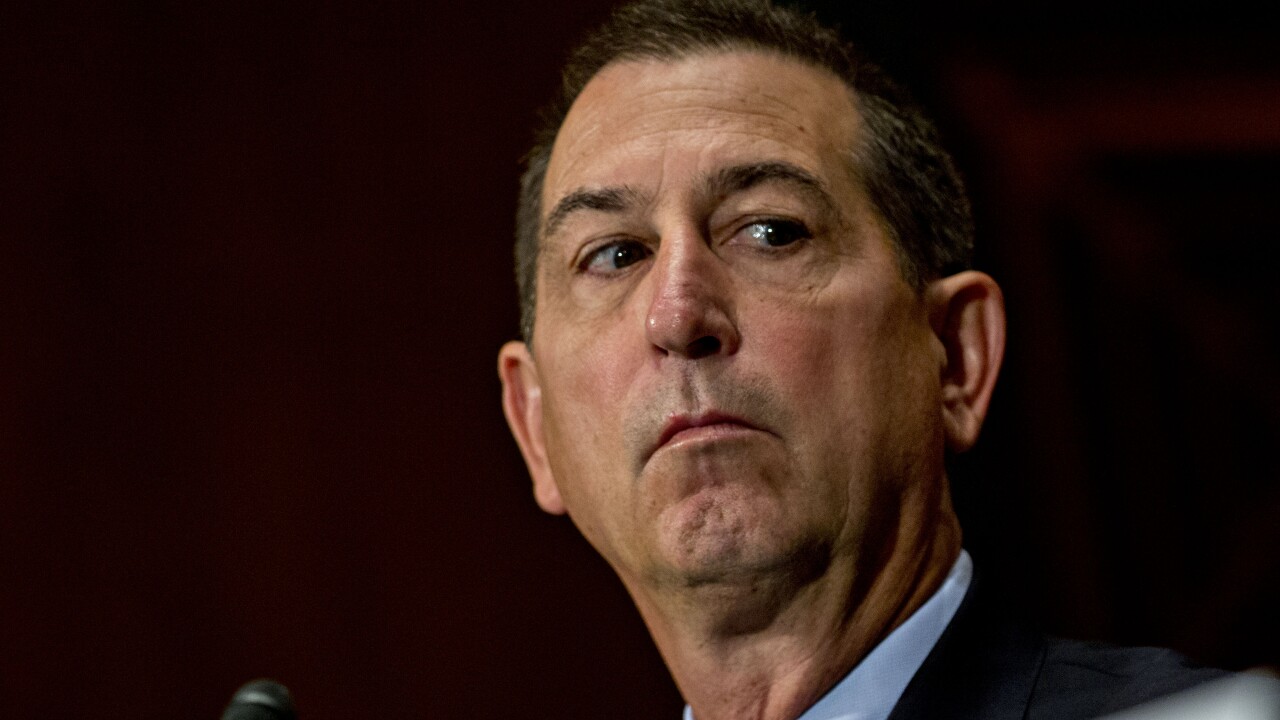-
Many in the industry applauded the Consumer Financial Protection Bureau's new mission statement shifting the agency's focus away from using enforcement actions as a substitute for rules of the road.
January 24 -
Acting Director Mick Mulvaney’s decision to halt the collection of consumer data renders bank exams less effective and ignores existing cybersecurity protections, the Massachusetts senator argues.
January 24 U.S. Congress
U.S. Congress -
Three Trump administration nominees faced thorough questioning from the Senate Banking Committee, although Democrats reserved much of their fire for the president’s nominee to the Federal Reserve Board.
January 23 -
Acting Consumer Financial Protection Bureau Director Mick Mulvaney has cited hundreds of confirmed and suspected data breaches as justification for his halting the bureau's data collection activities last month.
January 19 -
Comptroller of the Currency Joseph Otting blasted a letter from Senate Democrats criticizing his agency for not implementing recommendations on supervision in the wake of the Wells Fargo scandal.
January 18 -
Cryptocurrencies continue to dominate much of the news, with a warning on bitcoin taking the top spot and a story about Ripple's partnership with MoneyGram doing well. Housing finance reform, Wells Fargo and the CFPB also featured.
January 12 -
The CFPB's recent freeze on collecting any personally identifiable information from companies it supervises is slowing investigations and could ultimately cripple the agency's enforcement function — and that may be the point.
January 10 -
The two senators are set to introduce a bill that would force such firms to pay $100 per customer whose personal information was compromised.
January 10 -
Examiners focus too much on how many suspicious activity reports banks file and too little on the true riskiness of their activities, according to lawmakers and industry representatives.
January 9 -
Sen. Elizabeth Warren, D-Mass., is asking acting CFPB Director Mick Mulvaney to account for recent directives limiting agency staff members’ ability to access or acquire electronic data, saying the moves hamper critical agency operations.
January 8 -
Over the past year, the focus of several banking policymakers has been how much the regulatory pendulum might swing back toward the industry’s liking. That theme will likely continue in 2018.
January 1 -
When the acting director of the Consumer Financial Protection Bureau announced plans to bring aboard political appointees, many viewed it as antithetical to an independent regulator. But technically there is nothing stopping him.
December 15 -
Despite concerns from Democrats about the bank regulatory views of Federal Reserve Board officials who will lead the central bank going forward, the current Fed chair said she is not worried.
December 13 -
Over 30 current and former Democratic lawmakers filed a new amicus brief Monday supporting Consumer Financial Protection Bureau Deputy Director Leandra English to be reinstated as acting director of the agency.
December 11 -
A bipartisan Senate alliance working on a bank regulatory relief bill appeared even stronger Tuesday as it worked to minimize changes in the interest of moving the legislative package to the Senate floor.
December 5 -
Sen. Elizabeth Warren, D-Mass., was the only member of the Senate Banking Committee to oppose the nomination of Federal Reserve Board Gov. Jerome Powell to lead the central bank.
December 5 -
The ill will between Democrats and Republicans in the controversy over appointing an acting Consumer Financial Protection Bureau chief adds a new wrinkle to bipartisan efforts to pass regulatory relief.
December 1 -
Sens. Elizabeth Warren, D-Mass., and Chris Van Hollen, D-Md., sent a letter to OCC officials suggesting that Bank of Tokyo was trying to avoid an investigation by New York examiners when it switched to a federal charter.
November 20 -
It's been a decent year for banks, especially given the industry's return on assets hit a 10-year high. But there are signs it might not last. With Halloween near, here is a look at some potentially frightening developments that could keep bankers up at night.
October 29 -
Brian Montgomery appears headed for easy confirmation for another stint as commissioner of the Federal Housing Administration, despite objections by Sen. Elizabeth Warren that he is too close to the financial services industry.
October 26

















